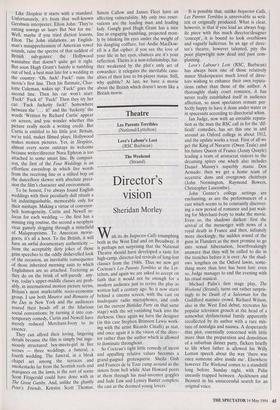Theatre
Les Parents Terribles (National/Lyttelton) Love's Labour's Lost (RSC Barbican) The Weekend (Strand)
Director's vision
Sheridan Morley
With its An Inspector Calls triumphing both in the West End and on Broadway, it is perhaps not surprising that the National Theatre should have developed a taste for high-camp, director-led revivals of long-lost classics from the 1940s. Thus we now get Cocteau's Les Parents Terribles at the Lyt- telton, and again we are asked to accept on faith that it would not be enough for a modern audience just to revive the play as written half a century ago. So it now starts behind a cinema screen, with the cast on inadequate radio microphones, and ends (as the current Birthday Party on that same stage) with the set vanishing back into the darkness. Once again we have the designer (in this case Stephen Brimson Lewis work- ing with the artist Ricardo Cinalli) as star, and once again it is the vision of the direc- tor rather than the author which is allowed to dominate throughout.
So Cocteau's tight little comedy of incest and appalling relative values becomes a grand-guignol grotesquerie. Sheila Gish and Frances de la Tour camp around as the sisters from hell while Alan Howard peers at them through his mad-inventor goggles and Jude Law and Lynsey Baxter complete the cast as the doomed young lovers. It is possible that, unlike Inspector Calls, Les Parents Terribles is unrevivable as writ- ten or originally produced. What is clear, however, is that if you load an always frag- ile piece with this much director/designer `concept', it is bound to look overblown and vaguely ludicrous. In an age of direc- tor's theatre, however talented, pity the poor playwright now dead and past com- plaining.
Love's Labour's Lost (RSC, Barbican) has always been one of those relatively minor Shakespeares much loved of direc- tors wishing to enhance their own reputa- tions rather than those of the author. A thoroughly shaky court romance, it has never really established itself in audience affection, so most spectators remain per- fectly happy to have it done under water or in spacesuits according to directorial whim.
Ian Judge, now with an enviable reputa- tion as the man the RSC call in for the 'dif- ficult' comedies, has set this one in and around an Oxford college in about 1912, and the update works a treat. First of all we get the King of Navarre (Owen Teale) and his future Queen of France (Jenny Quayle) leading a team of aristocrat visitors to the dreaming spires one which also includes Daniel Massey's superbly manic Don Armado: then we get a home team of eccentric dons and overgrown choirboys (John Normington, Raymond Bowers, Christopher Luscombe).
John Gunter's college settings are enchanting, as are the performances of a cast which seems to be constantly discover- ing a new period of romance and just wait- ing for Merchant-Ivory to make the movie.
Even so, the shadows darken: first the arrival of the messenger with news of a royal death in France and then, infinitely more shockingly, the sudden sound of the guns in Flanders as the men promise to go into sexual hibernation, heartbreakingly unaware that they will be called to die in the trenches before it is over. As the shad- ows lengthen on the Oxford lawns, some- thing more than love has been lost: even so, Judge manages to end the evening with his ritual musical.
Michael PaIM's first stage play, The Weekend (Strand), turns out rather surpris- ingly to be Death of a Salesman for the Guildford matinee crowd. Richard Wilson, also in the West End debut, recreates his popular television grouch at the head of a somewhat dysfunctional family apparently recollected by its author with a rare mix- ture of nostalgia and nausea. A desperately thin plot, essentially concerned with little more than the preparation and demolition of a suburban dinner party, flickers briefly to life when father is allowed his Willy Loman speech about the way 'there was once someone alive inside me'. Elsewhere however The Weekend comes to a standstill long before Sunday night, with Palin uneasily trapped between Ayckboum and Bennett in his unsuccessful search for an original voice.


























































 Previous page
Previous page